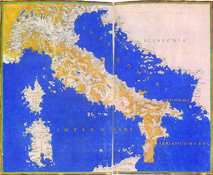
Symposium Program (PDF)
Color version (PDF)
This trans-disciplinary symposium is designed to bring together distinguished scholars from the University of Rome “La Sapienza” with Notre Dame faculty members from various departments whose scholarly interests and research are related to some facet or another of Italian history and culture from classical antiquity to the present. The aim is to showcase the importance and prominence of Italian Studies at Notre Dame and within the humanities at large.
In addition to helping those of us at Notre Dame to assess more or less coherently the range and variety of our colleagues’ scholarly interests that fall within the compass of Italian Studies (broadly defined), the symposium will provide us with a valuable occasion to further enrich and extend the relationship between our university’s faculty and La Sapienza’s. In June 2007, the Faculty of Letters of the University of Rome hosted a two-day symposium at which faculty members from the two universities delivered papers and held discussions on their scholarship and research projects.
Participants include: Maurizio Albahari, Roberto Antonelli, Zygmunt G. Baranski, Martin Bloomer, Piero Boitani, Keith Bradley, Joseph Buttigieg, Theodore Cachey, Paolo Carozza, Robert Randolf Coleman, JoAnn Della Neva, Dennis Doordan, Sabrina Ferri, Sabine McCormack, Elizabeth Mazurek, Margaret Meserve, Christian Moevs, Vittorio Montemaggi, Thomas F.X. Noble, Pierpaolo Polzonetti, Charles Rosenberg, Ingrid Rowland, Maria Serena Sapegno, Andrea Simoncini, and John Welle.
Organizing committee:
- Keith Bradley, Department of Classics
- Joseph A. Buttigieg, Ph.D. in Literature Program
- Theodore Cachey, Department of Romance Languages & Literatures
- Dennis Doordan, The School of Architecture, Department of Art, Art History and Design
Sponsored by the College of Arts and Letters, the Department of Romance Languages and Literatures, the Devers Program in Dante Studies, the Nanovic Institute for European Studies, and the Ph.D. in Literature Program.
For further information, please contact Dr. Demetrio Yokum.